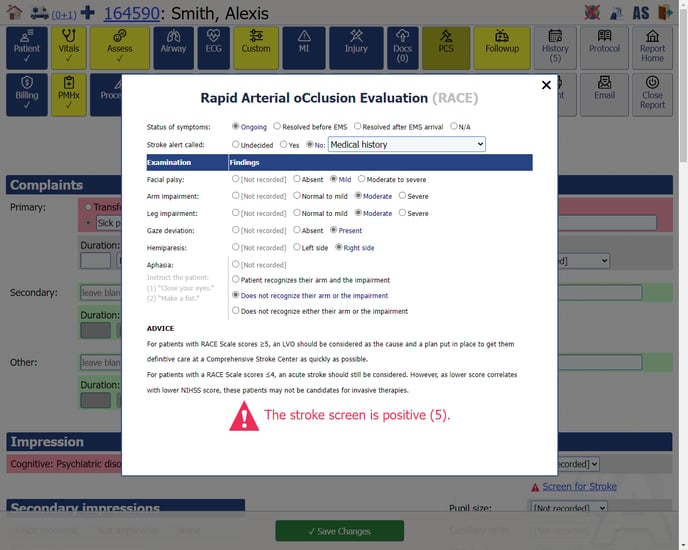Stroke Scales / Stroke Screens / Stroke Scores
Learn about the PCR's built-in interactive stroke screens, and how the data is reported to your state trauma registry.
AngelTrack's PCR has a choice of interactive stroke screens. It can also accept generic results from a stroke screen performed by hand or on paper.
Interactive Stroke Screens
AngelTrack's PCR has a choice of interactive stroke screen:
- Los Angeles Prehospital Stroke Screen (L.A.P.S.S.)
- Rapid Arterial oCclusion Evaluation (R.A.C.E.)
- Cincinnati (C.P.S.S.)
- Alabama E.M.S.A.
- Orange County CA
Your supervisor can select which stroke screen your agency uses by visiting the Preferences page under Settings.
The stroke screen is a popover shown by the PCR's "Assessment" page. The screen can be activated manually; it will activate automatically if the crew member enters certain exam findings that are correlated with stroke.

This feature is also available in the offline PCR.
Manually Recording a Stroke Screen
If you perform a stroke screen without the help of AngelTrack's interactive screen, or not otherwise associated with your patient assessment, then the answer goes into the PCR-Vitals page, not the PCR-Assessment page. This is due to the design of the NEMSIS specification governing EMS data.
Numeric Scores
Two of the interactive stroke screens produce a numeric score:
- R.A.C.E.
- Alabama E.M.S.A.
If your state's custom EMS reporting requirements include a numeric stroke score, then you must choose one of the above screens for use in AngelTrack, because the other choices do not produce a numeric score and thus cannot satisfy your state trauma registry.
NEMSIS Reporting
As noted above, the NEMSIS specification dictates that stroke screen results are reported within the PCR-Vitals findings. As such, the attending can record a stroke screen result on each PCR-Vitals taking in AngelTrack; or, he can leave it set to "Auto (from Assessment)", and AngelTrack will send within the PCR-Vitals record the stroke screen result taken from the chronologically nearest PCR-Assessment record.